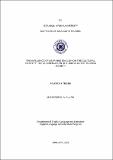Please use this identifier to cite or link to this item:
http://hdl.handle.net/11547/7555Full metadata record
| DC Field | Value | Language |
|---|---|---|
| dc.contributor.author | H. A. ALLOH, MAHMOUD | - |
| dc.date.accessioned | 2021-05-04T09:40:22Z | - |
| dc.date.available | 2021-05-04T09:40:22Z | - |
| dc.date.issued | 2021 | - |
| dc.identifier.uri | http://hdl.handle.net/11547/7555 | - |
| dc.description.abstract | The urgent need for English everywhere in the world leaves no choice but to learn English. However, a considerable number of people across the world learn English. As a result of the increasing number of English learners, many effects have been posed in different societies, and the Turkish one is included. We dedicated this paper to talk about Turkish culture and the influence of English on it in detail. Such a study is urging us to thoroughly discuss few highlighted points to clarify the effects of learning English on Turkish society as the representation of English and Turkish according to Turkish people, the influence of learning English on the cultural identity of people in Turkey, and the glorification of the Turkish language according to Turkish people. The reasons why we are carrying out such a study in the field of cultural identity are summed up into three main reasons, which are; 1- The lack of research on the field of culture in the world generally and in Turkey, specifically. 2- Many people refrain from learning English for different reasons, which does not allow the society to be a multi-lingual one. Therefore, we devoted a particular part of this study to investigate these reasons. 3- The investigation of the Turkish language glorification according to Turkish people in Turkey and if it is one of the causes that refrain people from learning English. However, this issue is a noteworthy one in this study, which makes it more significant hence it is the only one investigating the glorification of the Turkish language in Turkey. This paper took place in Istanbul, Turkey, and the data of this study was collected after getting a questionnaire fılled in by two different groups of people. The population of the English-speaking group is 34 participants, while the population of the Turkish- speaking group 43 participants. The first group consists of English language speakers who speak at least a B1 English level fluently, and who fılled the questionnaire in English. The second group consists of people who are mono-language Turkish speakers and who filled the questionnaire in Turkish. Finally, it is worth noting that this investigation is an adoption of Hopkyns (2015), which was concerned about the Emirati culture. However, we are adopting this study to investigate the Turkish culture | tr_TR |
| dc.subject | Culture | tr_TR |
| dc.subject | Cultural Identity | tr_TR |
| dc.subject | Learning | tr_TR |
| dc.title | THE INFLUENCE OF LEARNING ENGLISH ON THE CULTURAL IDENTITY: THE GLORIFICATION OF TURKISH IN THE TURKISH SOCIETY | tr_TR |
| dc.type | Thesis | tr_TR |
| Appears in Collections: | Tezler -- Thesis | |
Files in This Item:
| File | Description | Size | Format | |
|---|---|---|---|---|
| 10380086.pdf | 1.06 MB | Adobe PDF |  View/Open |
Items in DSpace are protected by copyright, with all rights reserved, unless otherwise indicated.
